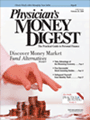Publication
Article
Physician's Money Digest
Regain Confidence in the Foreign Market
Author(s):
Fast forward:
In 1993, Americans invested heavily inforeign markets. Shortly after, Asianmarkets sank in a multiyear recession.Back at home, US markets took off andcontinued to soar throughout the 1990s.Those that invested abroad were quicklydisappointed. Once again,Americans are investing large amounts ofmoney abroad. According to data fromMorgan Stanley, Americans invested $60billion abroad in 2003. Will history repeatitself? Professional investors and analystsdon't think so.
International Investing
Back in 1993, many American investorsshifted their money out of USstocks and into foreign stocks. AlanBrown, chief investment officer of StateStreet Global Advisors, says that hasn'tbeen the case this time around. Instead,American investors are shifting theirfunds out of bonds. In effect, Brown says,they're rebalancing their portfolios toget equity weights back to where theywant them to be.
New York Times
Sidebenefit:
Other analysts are skeptical about thestrength of a US economic resurgence,despite how strong the stock market hasbeen recently. In a article,John Velis, global equity strategist at HSBCin London, points out that while profitsare growing, wages and investments arenot. He advises Americans to investabroad to diversify their portfolios. They may be able to achieve highertotal returns with lower risk.
The numbers certainly support analysts'views. Data from BloombergFinancial Markets reveal that since thebeginning of 2003, benchmark indexeshave risen 33% in Germany, 13% inFrance, 15% in Italy, and 22% in Spain.Those numbers compare with a 21%gain in the S&P 500 stock index. In 2003,the key Asian markets of Hong Kong,Korea, and Singapore rose about 30%,while Latin American markets were upmore than 60%—despite these numbers,fund managers prefer European andAsian markets.
Global Stock Leaders
Times
Analysts still point to the UnitedStates as the engine when it comes toglobal growth. In the article,Brown points to the high growth rate ofAmerican output (8.2%) during the thirdquarter of 2003. Tom Elliott, a strategistin London for JP Morgan Fleming AssetManagement, agrees with Brown thatthe American economy is likely to propelgrowth worldwide. He suggests that thebest way to benefit from such a growthspurt is to invest in the countries whereAmerican businesses are investing.
Times
Elliott notes in the article thatinvestors should not buy into theShanghai Stock Exchange, which he sayshas been underperforming. Instead, herecommends buying China harvest stocks(ie, the stocks of foreign companiesdoing business in China). Hugh Young,head of global equities in the Singaporeoffice of Aberdeen Asset Management,agrees that Asian stocks are a good idea;he points out that the region has longterm,above-average growth prospects,with equities that are reasonably valued.
Bottom line:
Neil Rogan, head of global equities inLondon for Gartmore Global Investments,says that the best way to tap into the newglobal tech boom is through Asian investing.He notes that the leaders in areas likeflat-screen televisions, digital cameras, andmobile phones are Japanese and otherAsian companies. Going internationalturned out to be a mistake adecade ago, but analysts say the times andcircumstances are different today. So, asyou look to rebalance your portfolio, considerthe global market.
